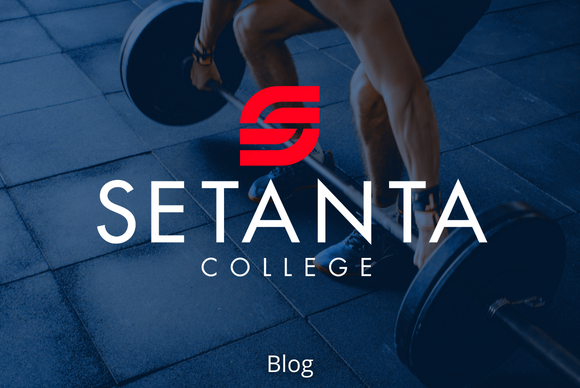Our #SetantaStudentSpotlight continues this week with Gary Brennan. Gary is a former Clare footballer and a student on our Master of Science in Performance Coaching. Gary Brennan gave us an insight into his thoughts on how the GAA has been progressing over the years, training practices, and why he chose to study with Setanta College.
Having been involved in the inter-county setup since the mid to late 2000s, you have seen the growth of Strength & Conditioning within GAA first-hand. What impact do you think this has had on the standard of the game?
I think overall it has had a positive impact on the game – in situations where there is good practice, players are better conditioned for the demands of the game, training is more efficient and player-centered, and as a result, the athletic ability of the average player is quite impressive now compared to when I was starting off.
I think the skills of the game and the ability to make good decisions and execute those skills under pressure are still the most important element of any sport. There is a danger that some players become overly focused on strength and conditioning. This can sometimes to the detriment of their overall performance if the gains they are chasing in the gym/on the pitch are not relevant to their role.
The growth of S&C has offered huge opportunities when used well.
What were the biggest changes you noticed in inter-county GAA over time throughout your career with Clare?
I would say the biggest change was probably in the style of play that is most employed. It’s rare nowadays to see teams go man-to-man. Some might do it for a period of the game but most teams now base their approach on having a defensive structure in place that will make it difficult for the opposition to score and then trying to be as efficient as possible in attack. When I first started playing it was far more open, there were more individual battles. To see a short kick-out was a rarity!
Also, similar to the previous question, the condition of the average player has changed. When I started at intercounty there was a focus (for me at least) on bulk and adding mass to be able to compete physically in the air with the giants that were around in those days. Nowadays, there’s more focus on speed and speed endurance, agility, and overall athletic performance.
What do you see as the main differences between club & inter-county GAA? Is there something within inter-county training/set-ups, etc that you think could be replicated on a smaller scale at club level?
The primary difference is the pace of the game. Usually, at intercounty, things happen quickly and there is less time for recovery, or mistakes are more likely to be punished by the opposition.
I think a lot of club teams are already trying to replicate what happens at the intercounty level. I think there’s a delicate balance here. There’s more of an appetite for information & learning at club level now, but the key for me remains to focus on performance. Replicating something done at the intercounty level may not be the best thing for a club group. Is it improving performance on the pitch? Or helping to develop the player as a person? Those are key questions the coach needs to know their group and figure out what will help to get the best out of them.

What is the best piece of coaching advice you received throughout your career?
I’ve been fortunate to work with some outstanding coaches and learned a huge amount from them, but the best piece of advice remains the simple advice my parents gave me – to get out and practice and to give it my best.
I was never pressured but I was always encouraged to get out with the ball and practice my skills. I maintain it was that practice that gave me good fundamentals and allowed me the opportunities I got later in life.
What are your thoughts about the upcoming GAA split season? Do you think it will improve player performance?
I like the idea. I have been saying for quite a while that I think it is worth trialing at least. One of the main arguments against it often seems to be that our games won’t get the same exposure in the media throughout the year and may suffer in comparison to other sports. I’ve always wondered about that. Why not promote our club games when the intercounty season is finished? There are more games and players to write about and see during the club season than intercounty! That is just my uninformed view!
As regards team preparation and player performance, I think it offers coaches and players an opportunity to develop more focused training and recovery schedules.
It will also mean intercounty players can be fully present with their clubs during that part of the season and that can have a hugely positive impact on the standard at club level.
You’ve recently joined Setanta College as a student on our MSc in Performance Coaching programme, what motivated you to start studying this course and why did you choose Setanta?
I had been looking into some further study options for quite some time and was delighted to get the opportunity to join the MSc in Performance Coaching with Setanta College. The college has an excellent reputation and I was very enthusiastic about getting the opportunity to learn from the staff there. I was extremely fortunate to get support from Setanta College and the GPA to enable me to take on the course. Taking a career break to study wasn’t an option for me so it’s great to be able to fit the study in around my full-time job. I had also spoken to players who enrolled on other courses and the feedback was all positive.

I’m very interested in human performance and had found myself looking for more information quite a bit. My undergrad in PE gave me a good understanding of a lot of the fundamentals but I wanted to try and expand that understanding while getting practical experience. Obviously, most of my experience so far has been on the playing side but I have also been coaching for several years and doing some personal training with individual clients, so I am keen on trying to develop myself as a coach.
How do you feel the course has/will help you understand your own training?
I think it‘s encouraging me to constantly reflect on what we are doing, to look at how our training is impacting performance, and to look at how we can make training as impactful but as efficient as possible.
It’s challenging some of my preconceived notions, which is great and encouraging me to look towards evidence-based practice. Hopefully, it will help to make me a more informed coach and add to my practice
How have you found the balance of studying, working, and club training?
It’s been busy! It’s certainly keeping me occupied! In some ways, the timing is probably good for me, in that we don’t obviously have collective training at the moment so I’ve been able to manage my time as suits me. I’ve also been struggling with an ankle injury I picked up in last year’s club championship so I probably haven’t been spending as much time training as I might otherwise have been doing.
I’m pretty good at managing my time, making a schedule, and sticking to it so it’s been OK for me – my wife might not agree though!
Who has been the biggest influence on your sporting career?
My family – I have been extremely fortunate that they have understood and supported my goals.
What advice would you give to younger players?
It depends on the player! In all seriousness though I think the best thing a young player can do is find what they enjoy and work hard at it. If that happens to be GAA, I will always maintain that it’s the most skilled players who make it to the very top so keep practicing the skills every day. All you need is a ball and a wall.
Master of Science in Performance Coaching
Gary is a student on the Setanta College Master of Science in Performance Coaching. You can find out more about the course here or by downloading the brochure below.


Leave A Comment